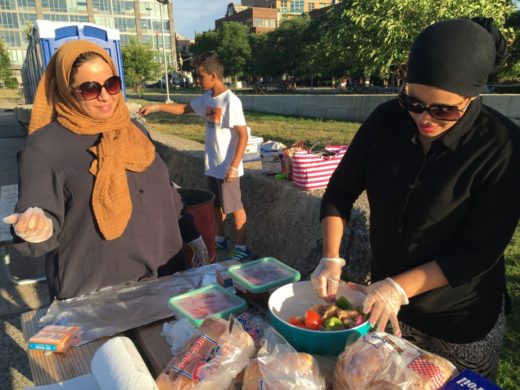
On a summer Saturday afternoon, 34-year-old Annesa Omer and her sister-in-law, Raja Omer, unpacked a Trader Joe’s bag full of groceries onto a picnic table near the playground at Bushwick Inlet Park in Williamsburg, in preparation for a meal at sunset on the grill.
“Watch your fingers, Laith!” Annesa called out to her 11-year old son, who wore a T-shirt that read, “Skate till you drop” as he unwrapped a package of beef hot dogs on the hot grill.
“The kids, we feed them at the same time,” said Annesa,” they’re not fasting, obviously.”
Annesa, a mother of two girls and one boy, and Raja, a mother of four girls, wore traditional hijabs and stylish sunglasses as they put on disposable gloves to thread marinated boneless chicken pieces onto skewers. They laughed easily with each other and their children, who took turns running up to the table to grab chips on their way to the playground.
Annesa and her brother, 32-year-old Ismaell Omer, often meet with their families during the Muslim observance month of Ramadan to share a meal and let the cousins play.
“We’re keeping it simple,” said Ismaell as he casually propped his sunglasses on top of his head while tending to hot dogs, hamburgers, and chicken kabobs on the grill.
Ismaell and his sister are two of eight siblings who were born in Brooklyn to Yemeni parents. They both live in the same Boerum Hill and Cobble Hill neighborhoods that they grew up in as kids. Their father was once a cook for a Middle Eastern restaurant in the neighborhood.
“My father loved to grill,” said Ismaell as he flipped a patty. “I don’t want to say this, but that’s what killed him. To tell you the truth—the cardiologist kept telling him to ‘stop with the meat, stop with the meat.’” Ismaell lined up the hot dogs on the grill. “He told me you only get one life, and if you’re going to live this life, enjoy it,“ he said.
Ismaell is tall with a playful smile. His wife, Raja, held their 3-month-old daughter Sofia next to him. He fanned the smoke from the grill. “I tried for the boy four times, got four daughters,” he said.” God bless them; they love daddy.”
He turned the kabobs as the sun began to set and said he could make it through the fast a little easier because he worked the night shift year-round in the telecommunications division of the NYPD as a civilian. Ismaell said that observers of Islam fast from sunrise to sunset during Ramadan. “I don’t have to struggle in the morning. I’ll just pray my morning prayer,” he said, “and then I’ll continue the day for about four more hours, and I’ll get sleep during the day.”
His wife, Raja, moved to Brooklyn from Yemen four years ago. Ismaell joked with her that she learned to speak English with a Brooklyn accent. She poured juice into a cup for one of the children and laughed. “It was hard to learn English,” she said, “I started to learn by watching movies.” Annesa, whose in-laws still live in Yemen, said she used to take the family to Yemen for long visits. She placed the hot dogs onto a platter. “We used to have a big house, much like a castle, we lived in when we would visit,” she said. “My father had once bought a big house there, but it is now all boarded up.”
Raja helped place the hamburgers in buns on the picnic table. “It’s hard for me here, the small houses,” she laughed, “I’m used to big houses.” She carefully placed the kabobs on the tray. “That’s because the houses were so much cheaper there,” she said.
Annesa set the hot dogs on the table. “But Brooklyn’s in our blood; it’s home,” she said.
Ismaell closed up the grill, ready to eat.
Annesa looked toward the waterfront at the sunset over midtown Manhattan. The visits to her parent’s homeland, she said, are a thing of the past. “It’s too dangerous,” she said. “Yes, we won’t be back to Yemen anytime soon.”


Leave a Reply